InnerPeace
Inner Peace ![]() (video of Religious Science teaching)
(video of Religious Science teaching)
Inner Peace is part of a larger community of spiritual centers known as the Global Religious Science Ministries, which is based on the work of Ernest Holmes. Holmes published The Science of Mind in 1926, and the following year founded Religious Science, a religious movement in the New Thought (not to be confused with New Age) tradition. Religious Science (also referred to as Science of Mind) focuses on how the individual interprets and acts on his/her own experiences. For some the slogan, “Change your thinking, change your life,” is the only necessary belief. As for practices, most centers throughout the world differ with respect to specific practices but focus primarily on emotional and spiritual healing (and the best means available to initiate the healing). Common to Religious Science groups is a five-step prayer treatment (Recognition, Unification, Realization, Thanksgiving, Release)
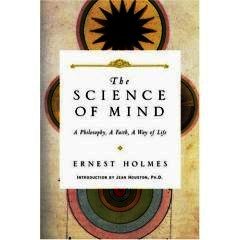 Religious Science first arrived in Richmond in 1994 with the ministry of Revs. Dwight and Thelma Smith. They established the Spiritual Mind Center of Richmond, and began teaching classes and holding services in the tradition of Religious Science. One of those who took the classes the Smiths offered was Lisa Marks. Rev. Marks received her certification after training with the Smiths and then moved on to establish her own center. Inner Peace was originally established in 2003 under the name EnerPeace, short for Energy of Peace. After separating from the other original founders, Rev. Marks moved what now became Inner Peace to its current address on Skipwith Road.
Religious Science first arrived in Richmond in 1994 with the ministry of Revs. Dwight and Thelma Smith. They established the Spiritual Mind Center of Richmond, and began teaching classes and holding services in the tradition of Religious Science. One of those who took the classes the Smiths offered was Lisa Marks. Rev. Marks received her certification after training with the Smiths and then moved on to establish her own center. Inner Peace was originally established in 2003 under the name EnerPeace, short for Energy of Peace. After separating from the other original founders, Rev. Marks moved what now became Inner Peace to its current address on Skipwith Road.
Inner Peace is primarily a counseling center. Rev. Marks holds numerous small-group events ranging from the Lightworkers Workshop to classes on Science of Mind to emotional and spiritual counseling. With all of these offerings, the goal is personal empowerment. Not all of the events at Inner Peace are explicitly part of Religious Science. There are also events, like the Lightworkers Workshop, that utilize Pagan, New Age, and Asian methods of healing and empowerment. Attendance at Inner Peace events varies according to what is being offered. The classes tend to be similar in size to graduate-level seminars, but some events can draw as many as forty people into the small workshop room. Approximately sixty to seventy-five people attend the various center events on a regular basis. In the Science of Mind classes, the book, The Science of Mind, is used as a textbook, and the classes are treated like a college-level course. Successful completion of two years of classes prepares one to enter into the more difficult minister-preparation classes. Completion of these classes prepares one to become a Science of Mind minister.
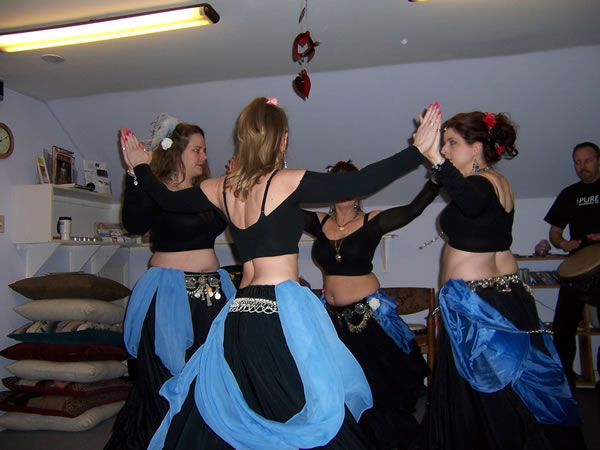 Other activities involve the Lightworker’s Circle, the Intender’s Circle, and the Healing Circle. In the Lightworker’s Circle, readers and healers donate their time to give readings and healings to anyone who comes. These meetings are usually held the second Friday of every month in the evening. Intender’s Circle is facilitated by a Science of Mind student, and this circle is for the purpose of putting your intentions out to the Universe with the support of the group in attendance. The first Sunday of the month features the Healing Circle, which is a time for song, meditation, sharing, and healing, along with a group potluck.
Other activities involve the Lightworker’s Circle, the Intender’s Circle, and the Healing Circle. In the Lightworker’s Circle, readers and healers donate their time to give readings and healings to anyone who comes. These meetings are usually held the second Friday of every month in the evening. Intender’s Circle is facilitated by a Science of Mind student, and this circle is for the purpose of putting your intentions out to the Universe with the support of the group in attendance. The first Sunday of the month features the Healing Circle, which is a time for song, meditation, sharing, and healing, along with a group potluck.
Inner Peace
3201 Skipwith Road
(Above Tauer Chiropratic Center)
Richmond, VA 23294
(804)-726-5500
Sources:
Inner Peace website
Profile prepared by Jon Headlee
September, 2007
MetropolitanCommunityChurch
METROPOLITAN COMMUNITY CHURCH OF RICHMOND
The Metropolitan Community Church of Richmond is a member of the Universal Fellowship of Metropolitan Community Churches (UFMCC). This Christian organization for the Gay/Lesbian/Bi-Sexual/Transgendered community was founded in 1968 in Los Angeles by Reverend Troy Perry. “Living Out Loud,” the vision statement for the Universal Fellowship of Metropolitan Community Churches, is taken from a quote from Emile Zola as he spoke at a funeral: “If you ask us why we came, we came to live out loud.”
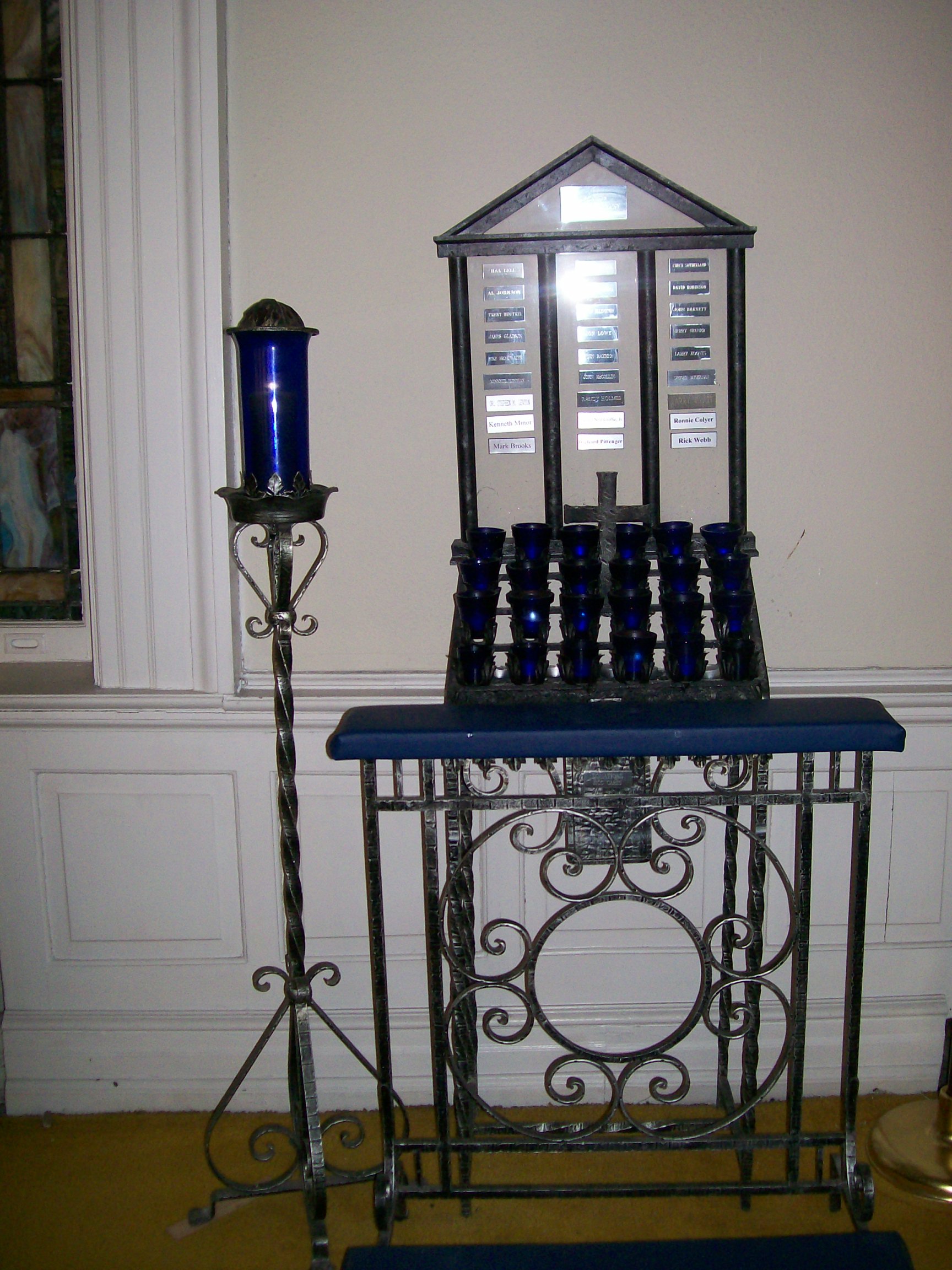 Nine years after the founding of the Universal Fellowship of Metropolitan Community Churches, the group’s Mid-Atlantic District Board of Home Missions formed a study group to determine the need of a congregation in Richmond, Virginia. At the Friends Meeting House, Richmond’s first Metropolitan Community Church met in June of 1978. The congregation initially was quite small; after a year there were thirty-three members. However, after two years worship attendance had fallen to five or six. Partially due to the efforts on the part Reverend Arthur Runyan to expand the female population of the congregation, which at the time was only ten percent, membership began to grow. By the middle of 1997, the congregation had grown to over 200 members, and in 1998, deacons were trained and began to serve as support for the congregation and the surrounding community. Metropolitan Community Church continued to meet at the Friends Meeting House until February of 1993 when, due to generous posthumous donations of members, they were able to purchase their own place of worship and make needed renovations.
Nine years after the founding of the Universal Fellowship of Metropolitan Community Churches, the group’s Mid-Atlantic District Board of Home Missions formed a study group to determine the need of a congregation in Richmond, Virginia. At the Friends Meeting House, Richmond’s first Metropolitan Community Church met in June of 1978. The congregation initially was quite small; after a year there were thirty-three members. However, after two years worship attendance had fallen to five or six. Partially due to the efforts on the part Reverend Arthur Runyan to expand the female population of the congregation, which at the time was only ten percent, membership began to grow. By the middle of 1997, the congregation had grown to over 200 members, and in 1998, deacons were trained and began to serve as support for the congregation and the surrounding community. Metropolitan Community Church continued to meet at the Friends Meeting House until February of 1993 when, due to generous posthumous donations of members, they were able to purchase their own place of worship and make needed renovations.
While this is a Christian organization, there are some fundamental differences between the Metropolitan Community Churches and more mainstream denominations. Unlike some other Christian denominations, the Metropolitan Community Church does not recognize all of the possible references to homosexuality in the Bible as truly addressing homosexuality. The focus for the MCC is fellowship. In these congregations, Christ’s love is stressed and viewed as all inclusive. Baptism or open acceptance of creeds is unnecessary. It is the goal of the MCC community to provide a strong support system and share faith.
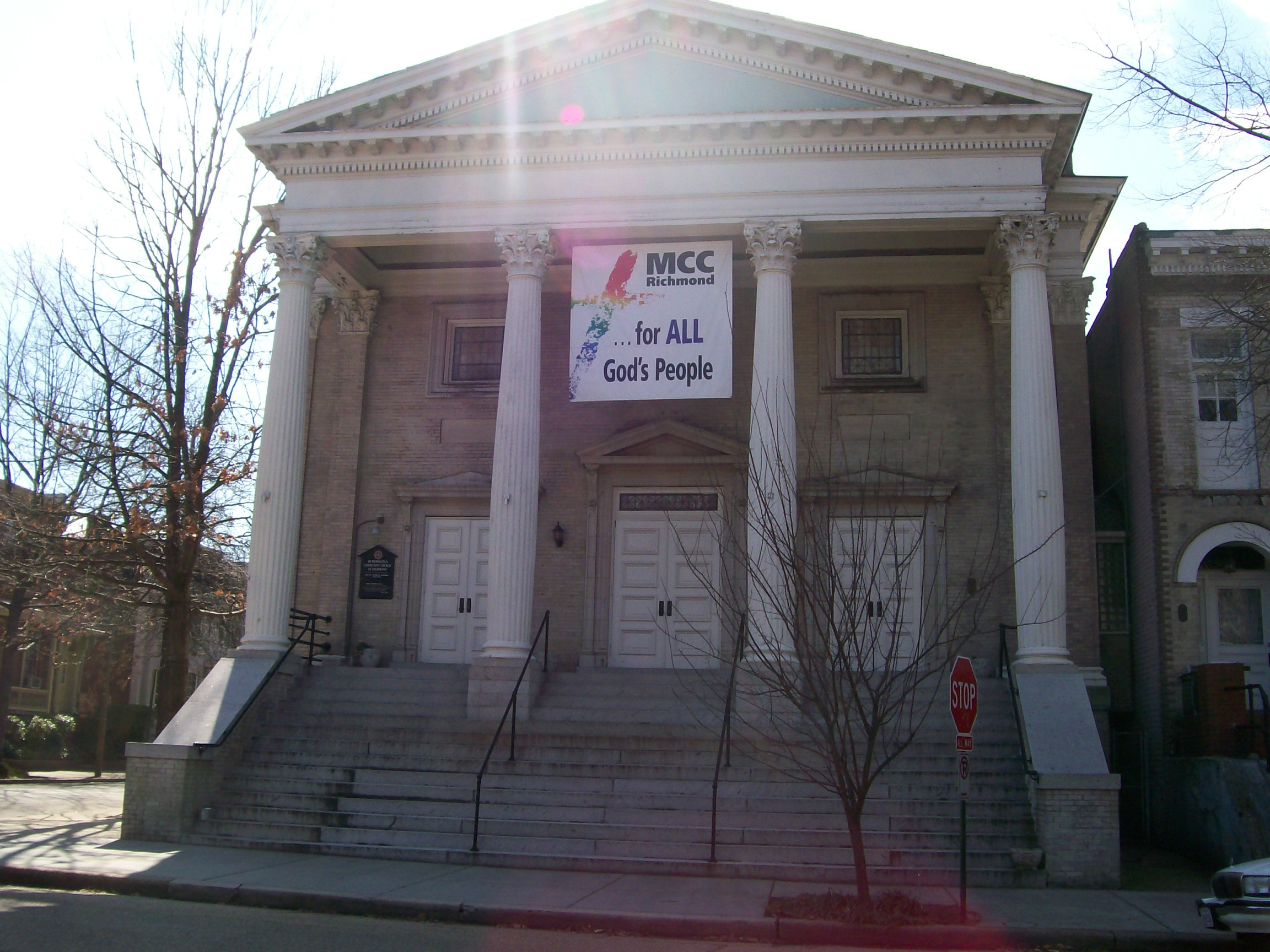 While the congregation welcomes and is comprised of people from varying racial and ethnic backgrounds, the majority of the membership is white and upper-middle class. Along with offering a Christian place of worship for the GLBT community, the Metropolitan Community Church sponsors a weekly Country/Western dancing event, a magazine called PRAXIS, encourages volunteering for Bingo nights held by Diversity Thrift, and promotes volunteering for Richmond AIDS Information Network (RAIN) and other organizations furthering understanding and support for those diagnosed with AIDS.
While the congregation welcomes and is comprised of people from varying racial and ethnic backgrounds, the majority of the membership is white and upper-middle class. Along with offering a Christian place of worship for the GLBT community, the Metropolitan Community Church sponsors a weekly Country/Western dancing event, a magazine called PRAXIS, encourages volunteering for Bingo nights held by Diversity Thrift, and promotes volunteering for Richmond AIDS Information Network (RAIN) and other organizations furthering understanding and support for those diagnosed with AIDS.
Metropolitan Community Church
2501 Park Ave.
Richmond , VA 23220
(804)-353-9477
Source:
www.mccrichmond.org
Alexis Liverman
February, 2007
PentecostalsofRichmond
The Pentecostals of Richmond ![]() (Video of a United Pentecostal Church International conference)
(Video of a United Pentecostal Church International conference) ![]() (Video of United Pentecostal Church International worship service)
(Video of United Pentecostal Church International worship service)
Along Chippenham Parkway a large, concrete cross is visible from the roadway. With the exception of the large cross that commands attention, the church itself may be easy to miss. At first glance, the church looks as if it is just another large warehouse so commonly seen off of Chippenham Parkway. Upon closer scrutiny, the façade clearly resembles traditional brick churches, with a modest steeple. The accompanying building next to the sanctuary has the appearance of a small community center. The church was founded by Reverend Joe Forbush in 1988. The church building was constructed in 1995 and is commemorated by a cornerstone for Rev. Forbush. The Pentecostals of Richmond was and is still commonly referred to as First Pentecostal Church of Richmond. The church website states that the church has changed it’s name, but some of the parishioners still refer to it as First Pentecostal.
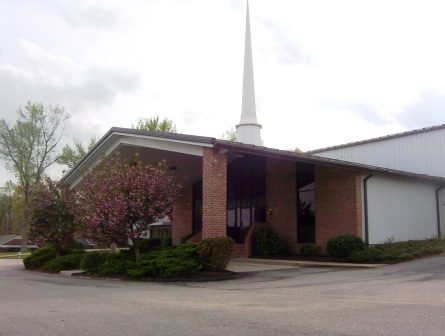 The Pentecostal tradition believes in “Oneness” of God, although God has manifested himself in different ways. God manifested as the Father in the Old Testament, Jesus in the New Testament and as the Holy Spirit thereafter. Pentecostalism celebrates the tradition of baptism by water and the re-birth of a person through baptism. The tradition practices glossolalia (speaking in tongues) and believes this it represents the initial reception of the Holy Spirit. The Pentecostal tradition also believes in Jesus Christ as their savior, and that he was the bodily manifestation of God, (incarnation). “While fully God, Jesus was also fully man, possessing a full and true humanity. He was both God and man. Moreover, the Holy Spirit is God with us and in us. Thus God is manifested as Father in creation and as the Father of the Son, in the Son for our redemption, and as the Holy Spirit in our regeneration.” The Pentecostal tradition also believes that the family unit is critical to the reception of God and the Holy Spirit, that marriage and the family is a sacred institution, and that fellowship in a church is necessary to fully realize God and the Holy Spirit.
The Pentecostal tradition believes in “Oneness” of God, although God has manifested himself in different ways. God manifested as the Father in the Old Testament, Jesus in the New Testament and as the Holy Spirit thereafter. Pentecostalism celebrates the tradition of baptism by water and the re-birth of a person through baptism. The tradition practices glossolalia (speaking in tongues) and believes this it represents the initial reception of the Holy Spirit. The Pentecostal tradition also believes in Jesus Christ as their savior, and that he was the bodily manifestation of God, (incarnation). “While fully God, Jesus was also fully man, possessing a full and true humanity. He was both God and man. Moreover, the Holy Spirit is God with us and in us. Thus God is manifested as Father in creation and as the Father of the Son, in the Son for our redemption, and as the Holy Spirit in our regeneration.” The Pentecostal tradition also believes that the family unit is critical to the reception of God and the Holy Spirit, that marriage and the family is a sacred institution, and that fellowship in a church is necessary to fully realize God and the Holy Spirit.
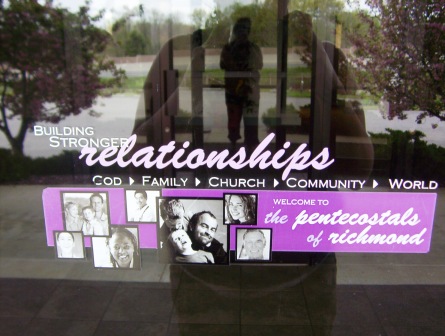 The Pentecostals of Richmond is an affiliate of the United Pentecostal Church International, which is headquartered in St. Louis, Missouri. The United Pentecostal Church International was formerly affiliated with The Pentecostal Churches and Assemblies of God. The United Pentecostal Church International grew out of the “Oneness” movement within the Pentecostal tradition. Prior to the Oneness movement, the Pentecostal tradition adhered to traditional Christian trinitarianism. Between 1913 and 1914, Rev. John G. Sheppe of the Assembly of God had a vision that instructed him to baptize in the name of Jesus rather than in the name of the Trinity. This triggered a schism within the Pentecostal movement. Over the next 20 years the movement struggled to retain the various dissenting churches and ministers, but quickly began dividing along doctrine and dogma lines. The United Pentecostal Church was founded in 1932 and then joined with several other dissenting segments of the tradition in 1937. In 1972 the church added “International” to its name. United Pentecostal Church International beliefs differ from mainstream Christianity in several areas: the church believes that one must be baptized in Jesus name to be saved, and that one must receive the Holy Spirit (speak in tongues) to be saved. The church also limits member access to television and mainstream media and regulates the length of men’s hair.
The Pentecostals of Richmond is an affiliate of the United Pentecostal Church International, which is headquartered in St. Louis, Missouri. The United Pentecostal Church International was formerly affiliated with The Pentecostal Churches and Assemblies of God. The United Pentecostal Church International grew out of the “Oneness” movement within the Pentecostal tradition. Prior to the Oneness movement, the Pentecostal tradition adhered to traditional Christian trinitarianism. Between 1913 and 1914, Rev. John G. Sheppe of the Assembly of God had a vision that instructed him to baptize in the name of Jesus rather than in the name of the Trinity. This triggered a schism within the Pentecostal movement. Over the next 20 years the movement struggled to retain the various dissenting churches and ministers, but quickly began dividing along doctrine and dogma lines. The United Pentecostal Church was founded in 1932 and then joined with several other dissenting segments of the tradition in 1937. In 1972 the church added “International” to its name. United Pentecostal Church International beliefs differ from mainstream Christianity in several areas: the church believes that one must be baptized in Jesus name to be saved, and that one must receive the Holy Spirit (speak in tongues) to be saved. The church also limits member access to television and mainstream media and regulates the length of men’s hair.
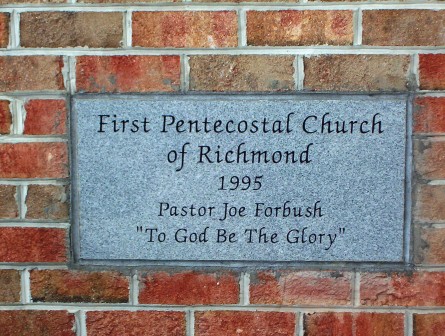 The church website states, “ The United Pentecostal Church International (UPCI) has been among the fastest growing church organizations in North America since it was formed in 1945 by the merger of the Pentecostal Church, Incorporated, and the Pentecostal Assemblies of Jesus Christ. From 617 churches listed in 1946, the UPCI in North America (United States and Canada) today lists 4,358 churches (which includes 4099 autonomous and 258 daughter works), 9,085 ministers, and reports a Sunday School attendance of 646,304. Moreover, it is also located in 175 other nations with 22,881 licensed ministers, 28,351 churches and meeting places, 652 missionaries, and a foreign constituency of over 3 million, making a total worldwide constituency of more than 4,036,945.”
The church website states, “ The United Pentecostal Church International (UPCI) has been among the fastest growing church organizations in North America since it was formed in 1945 by the merger of the Pentecostal Church, Incorporated, and the Pentecostal Assemblies of Jesus Christ. From 617 churches listed in 1946, the UPCI in North America (United States and Canada) today lists 4,358 churches (which includes 4099 autonomous and 258 daughter works), 9,085 ministers, and reports a Sunday School attendance of 646,304. Moreover, it is also located in 175 other nations with 22,881 licensed ministers, 28,351 churches and meeting places, 652 missionaries, and a foreign constituency of over 3 million, making a total worldwide constituency of more than 4,036,945.”
The Pentecostals of Richmond describe their services as vibrant. Their worship services are filled with lively and inspiring music. Members refer to their music as “anointed.” Their website states, “ We are a Bible believing church. We believe in miracles, healing, and the new birth experience as stated in the Book of Acts. Even though Jesus Christ died for sinners, He is not still on the cross, but lives in and through us. He is our Comforter and our Counselor, and most of all, He is the Way, The Truth and The Life.”
The Pentecostals of Richmond hold services on Sunday morning and evening. There is a mid-week Bible study group and a prayer service. Youth activities are held on Fridays. There is a service in Spanish on Saturday nights that is intended to reach the Spanish-speaking community, and Sunday services do include interpreters. The Pentecostals of Richmond have a vibrant music tradition that incorporates modern music, lively beats, and spiritual messages. The church sponsors youth choirs, adult choirs, musicals, and a live band. There are also Christian performing arts events during liturgical seasons and holidays.
The church offers a Bible study program that allows their members to study the Bible from home. It establishes a study-guide and walks people through various parts of the New Testament. The church asserts that it is critical for an understanding of the truth of God’s word that believers accept that the Bible is the sole authority for life and answers to life problems. If those who are studying the Bible have trouble understanding the scripture, they may call the church for assistance, which may consist of a phone conversation of a home Bible study session. Connected with the Home Bible Study is the Friend’s Fellowship, which is a weekly meeting at members” homes to discuss the Bible, the Word of God, and spirituality in a Christian fellowship setting.
The church also has several different ministries for members of various age groups. Like most Christian traditions they offer a Sunday School for all age groups, including a nursery. There are also groups for men, women, youth, and singles. The men’s group, M.O.S.T. (Men of Steel, Together) aims at strengthening men through faith and group encouragement, inspiring them to lead a life more fulfilled. The women’s group, W.I.S.H. (Women in Sisterly Harmony) is not only a prayer group but also an active coordination group for church events. Both of these groups are intended to help strengthen the faith of believers so that they may in turn strengthen their families and marriages. The Singles Ministry, (S.O.S. – Sold Out Singles) was created to address the issues facing modern singles with a faith-based perspective and focus. All groups are intended to increase spirituality and engender spiritual and social growth.
The Youth Ministry is called, R.A.G.E., Reaching a Generation for Eternity. They hold weekly services and activities and participate in youth oriented activities on a regular basis. R.A.G.E. was created to help instill values in youth that allow them to live within God’s purpose. In conjunction with the youth program is also a Boys and Girls Ministry that involves physical and social activity in coordination with Bible studies and spiritual exploration. This is aimed at youth ages seven through twelve.
The Pentecostals of Richmond offer what is called the Encounter Retreat, which they refer to as “A life-changing event where we spend two days at the foot of the cross.” The retreat is geared toward adults and youths and is intended to offer solitude for contemplation along with “Bible teaching, personal ministry, life changing encounters with God.” The retrea is intended to help members and believers “ Be sure of your salvation, Experience genuine repentance, Be set free by forgiving those that have hurt you, Experience the power of the cross, Break all chains that bind you to the past, Receive inner healing and be made whole, Receive and experience the power of the Holy Ghost, Receive clarity for God Vision for the end-time harvest of souls. The Encounter is an experience of coming face to face with God and His Word. You will understand the revelation of the power of the cross more than ever before. The Encounter confronts you and your past and uproots its negative influences totally from your life.”
The Pentecostals of Richmond International
2200 Pickens Road
Richmond, VA 23224
(804)-276-1105
Sources:
The Pentecostals of Richmond website
House, H. Wayne. Charts of Cults, Sects, and Religious Movements. Grand Rapids, MI: Zondervan Publishing House, 2000.
Profile prepared by Emily R. Sprouse
April, 2008
RayofHopePentecostal
Ray of Hope Pentecostal Church
The Ray of Hope Pentecostal Church was founded in 1960 by Reverend Carl L. Campbell. It was initially located on Fairmount Avenue and subsequently moved to it current location on Chatham Road. Ray of Hope is a member of the Redemption Ministries, which is located in Prince George County. Redemption Ministries, in turn, is a conference of the International Pentecostal Holiness Church, which is headquartered in Oklahoma City, Oklahoma.
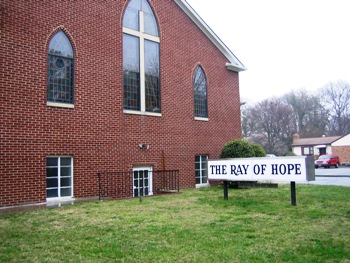 The church has approximately one hundred members, and most of them are middle age adults, though there is a sizeable contingent of youth from grade school to high school ages. The members come from mostly middle to upper-middle class families. The church has membership from New Kent County, Mechanicsville, Northside Richmond, Chesterfield County, Highland Springs and Sandston. Currently, its membership is mostly American Caucasian, but the church has had a long history of African-American and Hispanic- American membership as well, and it reaches out to all ethnicities, cultures and nationalities.
The church has approximately one hundred members, and most of them are middle age adults, though there is a sizeable contingent of youth from grade school to high school ages. The members come from mostly middle to upper-middle class families. The church has membership from New Kent County, Mechanicsville, Northside Richmond, Chesterfield County, Highland Springs and Sandston. Currently, its membership is mostly American Caucasian, but the church has had a long history of African-American and Hispanic- American membership as well, and it reaches out to all ethnicities, cultures and nationalities.
The church’s three formal services take place early and late on Sunday morning and again on Sunday evening. The church pastor describes the services at the church as less formal than most churches. For example, in addition to readings of scriptures and prayers, the pastor will also take requests from members about any personal or community issues that concern them that they would like to have addressed by the church. The church does not request offerings from its members, but does occasionally give money to struggling families or community members, or provide them with assistance, such as lawn work or home repairs.
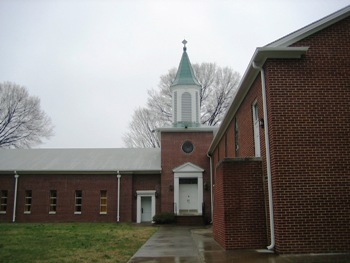 Ray of Hope Pentecostal Church contributes books, clothing, food and money to various charities, such as the Central Virginia Food Bank, Goodwill, and the Salvation Army. The church also sponsors missions, both foreign and domestic. Internationally, the church sponsors missionaries in the Ukraine, the Philippines, Africa, Germany, and Spain. Locally, the church conducts home Bible study outreach programs that take place in selected communities. These Bible studies consist of discussions of community goals and purposes, Bible readings, and prayers. Currently, there are five of these local study groups led by the church pastor every month and are advertised by fliers. Two are in Mechanicsville, one in the Parham Road Regency Mall area, one at the Patterson Avenue YMCA, and one in the Highland Springs and Sandston area. The church is also trying to establish a sixth, which would be located in Northside. The church’s pastor is gradually training other members to assume responsibility for leading the Bible studies.
Ray of Hope Pentecostal Church contributes books, clothing, food and money to various charities, such as the Central Virginia Food Bank, Goodwill, and the Salvation Army. The church also sponsors missions, both foreign and domestic. Internationally, the church sponsors missionaries in the Ukraine, the Philippines, Africa, Germany, and Spain. Locally, the church conducts home Bible study outreach programs that take place in selected communities. These Bible studies consist of discussions of community goals and purposes, Bible readings, and prayers. Currently, there are five of these local study groups led by the church pastor every month and are advertised by fliers. Two are in Mechanicsville, one in the Parham Road Regency Mall area, one at the Patterson Avenue YMCA, and one in the Highland Springs and Sandston area. The church is also trying to establish a sixth, which would be located in Northside. The church’s pastor is gradually training other members to assume responsibility for leading the Bible studies.
Ray of Hope Pentecostal Church
3105 Chatham Road
Richmond, VA 23227
(804) 353-8351
Sources:
Ray of Hope Pentecostal Church pastor
Profile prepared by Anthony Grillo
May, 2009
RichmondCitadel
Richmond Citadel (Corps)
The Corps serves as the ministry’s church location for spiritual guidance and outreach. It has been a major part of the Richmond Community for decades and has been at its current location on Orcutt Lane since the 1980’s. The Citadel is currently led by Pastor/Major Curt Sayre and Captain Natalie Sayre.
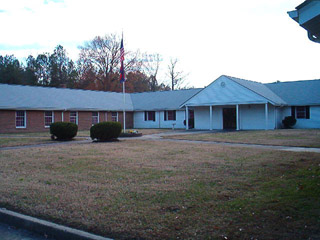 The Corps in Richmond serves not only as a center for worship and service, but also provides community outreach activities. There are activities almost every day of the week. On Sundays there is a morning worship service and an evening praise service for adults along with a Sunday school for children. Monday is youth night; Wednesday is senior night; Thursday is Bible study, Women’s ministry, and Men’s Club night; Friday is teen night. In addition to worship services and Bible study groups, the Corps offers a Sunday school, music program, senior programs, a summer day camp, youth activities and volunteer outreach for men, women and children. The music ministry includes a brass band composed of members of the Corps.
The Corps in Richmond serves not only as a center for worship and service, but also provides community outreach activities. There are activities almost every day of the week. On Sundays there is a morning worship service and an evening praise service for adults along with a Sunday school for children. Monday is youth night; Wednesday is senior night; Thursday is Bible study, Women’s ministry, and Men’s Club night; Friday is teen night. In addition to worship services and Bible study groups, the Corps offers a Sunday school, music program, senior programs, a summer day camp, youth activities and volunteer outreach for men, women and children. The music ministry includes a brass band composed of members of the Corps.
To help build strong character and nurture Christian faith in youth, the Corps has weekly scouting programs for boys and girls. They are called, Sunbeams for elementary school girls, Girl Guards for older girls and Adventure Corps for boys. Youth also have the opportunity to learn music education in the chorus or by learning to play the brass instruments. There is also a fine arts program.
The church follows the same traditions as it did over 100 years ago, with their officers or laymen holding military-like ranks. Corps officers are required to wear their uniforms during church services and corps business. The church is also distinctive in its requirement that unmarried female officers are required to marry within the church and must give up their positions if they marry non-members. The church consists of approximately 50 members who come from all walks of life. The corps officers are made up of sergeants or deacons. The congregation is ethnically mixed with around 60 percent Caucasian and 40 percent African American.
Richmond Citadel
5327 Orcutt Lane
P. O. Box 24249
Richmond, VA 23224
(804) 745-5524
Profile prepared by Amanda Sandiford
December, 2006
RichmondGraceFellowship
Richmond Grace Fellowship
Worldwide Church of God began as a radio ministry in Oregon in the early 1930’s. Herbert Armstrong, an advertising designer, started a radio ministry known then as The World Tomorrow as well as the companion magazine, The Plain Truth. Armstrong later moved the ministry to Southern California for greater radio access. He subsequently created a small school, Ambassador College , to train leaders for the church. Graduates of the school were sent to various cities to gather believers into the church. The church grew rapidly through the 1950s and 1960s, with the radio ministry becoming a television program and the magazine becoming the largest circulated magazine worldwide. As the church continued to grow, it changed names several times, eventually becoming Worldwide Church of God.
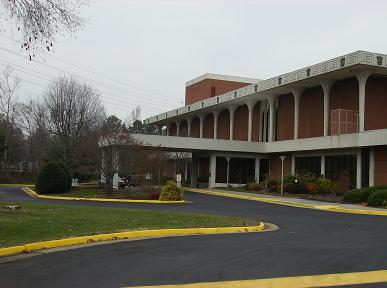 Armstrong had supreme doctrinal authority within the church and based his doctrine on three theological assertions: God is the creator, the Bible is true, and the Bible does not change the Sabbath to Sunday. He did not accept the doctrine of the Trinity. Members were required to tithe and were not allowed to vote, serve in the military, marry after divorce, seek medical attention from physicians, or wear cosmetics. The church did not observe individual birthdays or the Christmas and Easter holidays. Any person judged to be disloyal to the church and its teachings was likely to be expelled from the fellowship.
Armstrong had supreme doctrinal authority within the church and based his doctrine on three theological assertions: God is the creator, the Bible is true, and the Bible does not change the Sabbath to Sunday. He did not accept the doctrine of the Trinity. Members were required to tithe and were not allowed to vote, serve in the military, marry after divorce, seek medical attention from physicians, or wear cosmetics. The church did not observe individual birthdays or the Christmas and Easter holidays. Any person judged to be disloyal to the church and its teachings was likely to be expelled from the fellowship.
In the early 1980s the Worldwide Church of God was regarded as a heretical group in conservative Christian circles. After Armstrong’s death church doctrines and practices changed in a more traditionally Christian direction. The church began teaching that it was permissible for members to seek help from medical personnel, to use medicine, observe birthdays, and wear cosmetics. The church was divided over these doctrinal revisions, and by the late 1980s, several thousand members had left Worldwide Church of God to form the Philadelphia Church of God, a church that preserved Armstrong’s original teachings. The 1990s brought additional changes as church leaders challenged the biblical basis for Armstrong’s teachings. The church then accepted the doctrine of the Trinity, declared that the cross was not a pagan symbol, decided that Christians may vote, and permitted the observance of Christmas and Easter. Friends and families were split. A budgetary reduction began to affect the television broadcast, which eventually was cancelled. Most of Armstrong’s literature was discontinued or edited. The companion magazine is now called Christian Odyssey and has less than 20,000 subscribers.
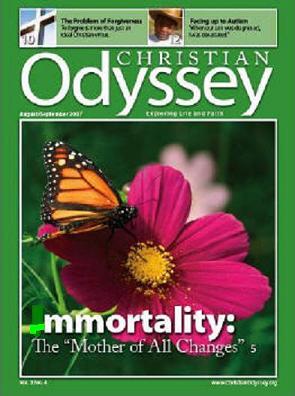 As the church modified its doctrines, the evangelical churches re-evaluated their stance toward the Worldwide Church of God, and in 1997 the church was accepted as a member of the National Association of Evangelicals and a partner denomination of Mission America and the American Bible Society. The Worldwide Church of God is now regarded as a conventional Christian denomination. With its headquarters still located in California , the church has approximately 64,000 members worshiping in 860 congregations in about 90 nations.
As the church modified its doctrines, the evangelical churches re-evaluated their stance toward the Worldwide Church of God, and in 1997 the church was accepted as a member of the National Association of Evangelicals and a partner denomination of Mission America and the American Bible Society. The Worldwide Church of God is now regarded as a conventional Christian denomination. With its headquarters still located in California , the church has approximately 64,000 members worshiping in 860 congregations in about 90 nations.
One of these congregations is located in Richmond on Hermitage Road . Richmond Grace Fellowship was founded in November, 1963 by a traveling pastor sent to Virginia by the Worldwide Church of God. Richmond Grace Fellowship has a small congregation of about sixty members of various ethnic backgrounds, with ages ranging from infants to elderly. Regular services are held every Sunday morning consisting of a Christian Living Class followed by Intercessory prayer, worship in song, and a sermon. After the sermon, the floor is opened for discussion. The congregation then may gather for a snack while they enjoy fellowship with one another. A communion service is held on the first Sunday of every month at Richmond Grace Fellowship in celebration of the common unity humanity has with one another and with God, the Trinity in Jesus. The congregation joyously acknowledges the Lords Supper in the spring with a special service that includes a foot washing ceremony and also holds special services for Christmas and Easter.
The congregation as a whole strongly believes in the pastoral care of the sick and infirmed. Each Sunday, the congregation will lift the sick up in prayer and will anoint with olive oil those that are in attendance. For those not able to attend the service, members will visit their homes or pray with them and offer encouragement by phone. The church purchases medicine for those who cannot afford it and have built wheelchair ramps for the handicapped. Richmond Grace Fellowship supports and helps staff Higher Grounds Summer Camp each year. The church also holds various outreach events and festivals throughout the year for the community; members regard these events not as a membership drive but as a means to share Gods love.
Richmond Grace Fellowship
Scottish Rite Temple
4204 Hermitage Road
Richmond , VA 23227
(804) 239-2027
Sources:
Pastor Bill Winn
Richmond Grace Fellowship website
Worldwide Church of God website
Profile prepared by Christina Williams
October, 2007
